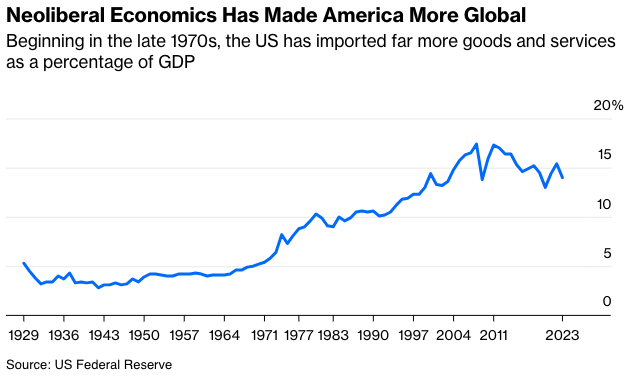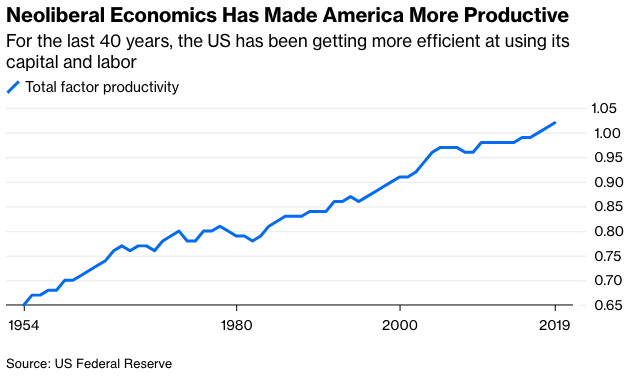Somehow it has become conventional wisdom that neoliberal economics was an abject failure. Like a lot of conventional wisdom, this is wrong. Not only has neoliberalism been a great success, but now is exactly the wrong time to reverse it.
That hasn’t stopped the bipartisan consensus from forming. Noting that neoliberal economics “left many working Americans and their communities behind,” one of President Joe Biden’s top advisers claims that the administration is pioneering a new industrial policy defined by tariffs and subsidies. Donald Trump promises similar policies, and would even take them up a notch.
The first problem with these critiques is definitional. Neoliberalism does not mean a strict adherence to free markets, the abolition of state intervention and a cult-like devotion to Milton Friedman. Yes, beginning in the 1970s, there was a general decrease in marginal tax rates, an increase in free-trade agreements, and easier flows of international capital. The so-called “Washington consensus,” fostered by institutions such as the International Monetary Fund, preached the benefits of less debt, more trade and reduced government intervention.
But it’s not as if the whole world listened. The number of regulations ballooned in the last several decades, as did debt in many rich countries. It is better to think of neoliberalism, as my Bloomberg Opinion colleague Clive Crook has noted, as an acceptance that market prices convey valuable information; that people respond to incentives; that resources are limited; and, above all, that policies involve tradeoffs. In other words: Neoliberalism is an acknowledgement that, in most situations, market-oriented solutions are better than the alternative.

As for the effect of neoliberal policies: The last 40 years have been some of the most prosperous decades in world history. Between 1990 and 2015, the share of people living in extreme poverty fell from 36% to less than 10%, and global life expectancy increased eight years. True, much of this was due to China opening its markets. Yet there is also is evidence that the more countries opened up to trade and adopted fiscal discipline, the better they did.
It wasn’t just poorer countries that benefited, either: Capitalist countries in the West that pursued freer markets also experienced a tremendous increase in standards of living. In 1990, male life expectancy in the U.S. was 71.8 years. In 2022, it was 76.7—and the U.S. lags behind other rich countries. Goods and services that were once luxuries for the wealthy are now common. Unemployment rates remained low, for the most part. Low interest rates made capital more accessible to people and businesses. And there were nearly four decades of low, stable inflation.
We can thank neoliberalism for all of it. Freer trade made goods cheaper and production more efficient. Easier flow of capital reduced both risk and interest rates. More open markets accelerated and enabled a transition from a manufacturing to a tech economy.
Was it perfectly smooth? Did it leave everyone better off? No and no. But no economic system ever has. Even some of the same economists who documented the downsides of the China shock still argue for the benefits of free trade. The only thing worse than too many people falling behind is no one getting ahead. US productivity may have been lower the last decade, but it is still growing much faster than it did in the 1970s.

Of course, an honest assessment of neoliberalism has to take into account its failures, too. People lost not only jobs but also a way of life. Depending on how you measure it, income growth slowed down. Also depending on how you measure it, wealth inequality worsened.
At the same time, quality of life improved at a greater rate than income growth decreased, as consumers now have access to a wider variety and better quality of goods. And the rise in wealth inequality is mostly due to the top 0.1% getting much, much richer. Wealth creation is not zero-sum. Does it matter that some people got super rich if almost everyone else became merely better off?
Neoliberalism is not some magic formula. But it does help clarify the tradeoffs inherent in economic policy. A more market-oriented approach offers a better chance of growth. A more statist policy offers greater predictability.
The latter may sound appealing after all the chaos of the last several years. But there are costs to less trade, smaller capital flows and greater government intervention in certain industries: A more predictable economy is also a less dynamic economy. In a world with growing debt and an aging population, that’s not a choice we can afford to make.
Allison Schrager is a Bloomberg Opinion columnist covering economics. A senior fellow at the Manhattan Institute, she is author of An Economist Walks Into a Brothel: And Other Unexpected Places to Understand Risk.
This article was provided by Bloomberg News.








